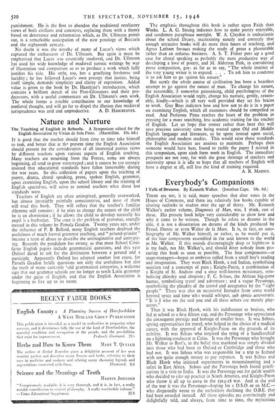Nature and Nurture
The Teaching of English in Schools. A Symposium edited for the English Association by Vivian de Sola Pinto. (Macmillan. 10s. 6d.) IT is good that the teacher should from time to time take himself to task, and better that at dr- present time the English Association should present for the consideration of all interested parties views by different teachers upon various aspects of English teaching. Many teachers are returning from the Forces, some are always beginning, all tend to grow stereotyped ; and it cannot be too strongly insisted that educational standards have fallen lamentably during the war years. So this collection of papers upon the teaching of poetry, drama, choral speaking, prose, spoken English, grammar, upon examining English, upon the school library and the training of English specialists, will serve to remind teachers what those lost standards were.
Teachers of English are often uninspired, generally overworked, but almost invariably painfully conscienticus, and most of them will read this book. They will reflect that the teacher's familiar dilemma still remains: if he tries to change the nature of the child he is an abortionist ; if he allows the child to develop naturally his pupil is a barbarian. The crux is the problem of grammar, soundly treated in this volume by Pamela Gradon. Twenty years ago, under the influence of P. B. Ballard, many English teachers doubted the usefulness of much formal grammar teaching, and " gerund-grinder " became a term of abuse to describe the unimaginative and uninspir- ing. Recently the pendulum has swung, so that most School Certi- ficate English papers include grammatical questions, and this year Oxford dared to ask for the distinction between a gerund and a participle. Apparently Oxford has adopted another lost cause, for Pamela Gradon boldly questions not only the usefulness but also the truth of many currently '-;eld grammatical categories, a welcome sign that our grammar schools are no longer to teach Latin grammar under the guise of English, and that the English Association is beginning to live up to its name.
The emphasis throughout this book is rather upon Faith than Works. L. A. G. Strong indicates how to make poetry enjoyable, and condemns paraphrase outright. W. A. Claydon is enthusiastic about the school library, maintaining stoutly and correctly that enough attractive books will do more than hours of teaching, and Agnes Latham favours making the study of prose a pleasurable rather than an arduous business. A. S. T. Fisher puts up a good case for choral speaking as probably the most productive way of developing a love of poetry, and M. Alderton Pink, in considering prose composition, goe; as far as to say, "The whole instinct of the very young writer is to expand. . . . To ask him to condense is to ask him to go against his nature."
But surely the whole course of civilisation has been a heartless attempt to go against the nature of man. To change his nature, the reasonable, if somewhat patronising, child psychologists of the English Association would reply, change his nurture, gently, reason- ably, kindly—which is all very well provided they set his brains to work. Guy Boas indicates how and how not to do it in a paper on examining English, which all examiners should be compelled to read. And Professor Pinto reaches the heart of the problem in pressing for a more searching, less academic training for the teacher of English. Let us hope that sooner rather than later this will save precious university time being wasted upon Old and Middle English language and literature, to be spent instead upon social, philosophic and modern studies. This would raise those standards the English Association are anxious to maintain. Perhaps then someone would have beers found to tackle the paper I missed in this symposium, upon sixth form work in English. The immediate prospects are not rosy, for with the great shortage of teachers and university space it is idle to hope that all teachers of English will have a degree at all, still less the kind of training required.
A. R. MAIDEN.


































 Previous page
Previous page